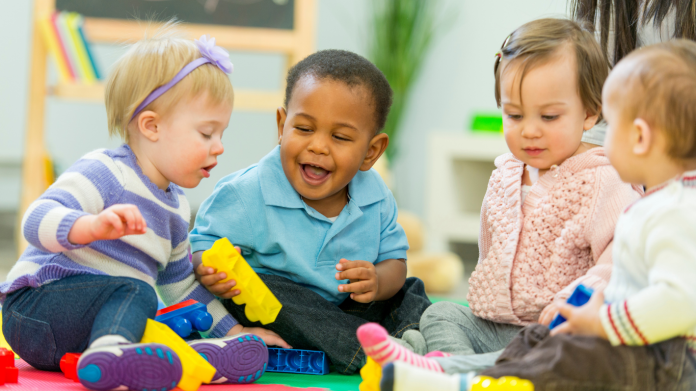Table of Contents
How to Encourage Cognitive Development Among Preschoolers
Cognitive Development Milestones in Preschool Children
Takeaways
Engaging with children through play is vital for cognitive development in childhood. By establishing an attentive and loving relationship with your child, you lay the basis for and support their development and learning opportunities.
It is possible to improve your preschooler’s cognitive abilities and boost their cognitive growth by engaging them in play. Children learn in a hands-on, concrete manner. Thus, engaging in a lot of play and contact is the ideal learning approach for young children. Inspire your child to utilize their imagination and ingenuity to solve difficulties by posing challenges.
Preschoolers generate ideas while they are having fun and using their imagination. To identify alternative answers to an issue, they employ their creative abilities. The more your child plays, the more they will be able to push themselves to their limitations, face new problems, and refine their decision-making abilities. As a result of their social interactions with adults and their classmates, they develop their linguistic skills.
How to Encourage Cognitive Development Among Preschoolers
Preschoolers learn best through play, mainly through child-led play. All sorts of play, including adult-guided play, are, on the other hand, helpful. Children engage in activities while playing, including exploration, thinking, creating, and experimenting. They also learn how things function and improve their problem-solving abilities. On the other hand, unstructured play is essential for children’s development since it promotes confidence and resiliency. It is via these experiences and interactions with others that they learn to share, cooperate, resolve disputes, bargain with one another, and form friends.
Encourage the cognitive development of your preschoolers with these suggestions.
- Allow for the possibility of mistakes. Young children are allowed to make mistakes; through mistakes, they learn their lessons. Naturally, we want to solve problems, yet, it is critical to allow them to make mistakes to learn from them.
- They should be congratulated on their achievements.
- Allow your preschooler to make decisions about things such as “what they want to eat,” “what to dress,” and “what they want to play” will help them develop decision-making skills.
- Engage in and enjoy valuable time together while playing.
- By inviting them to play with others, you may assist them in learning about friendship, sharing, and empathy. Try these simple social-emotional activities for preschoolers to see how they go.
- Encourage them to try new things or come up with alternative ideas.
- Invite your child to assist you with easy household tasks. Young children of this age like imitating adults and offering “assistance.” Engage children in age-appropriate household duties to help them develop their independence and confidence. Preschoolers as young as three can assist with laundry by putting socks together, sorting clothes by category or color, and putting away their toys and blocks. The kitchen is an excellent place for older toddlers to help by preparing basic snacks and helping to set the table. They may also help by clearing their dishes and watering the plants.
- Allow them the time to work things out, and not jumping in with a solution will help them in their problem-solving efforts.
- Communicate with your preschooler to help them develop their language abilities. During the game, you can ask questions such as “What happens next?”
- Make use of your child’s interests to help them grow and develop further. For example, if you notice that your preschooler has developed a fascination with whales, look for additional resources, such as books, crafts, games, or excursions (such as a visit to an aquarium), that will help them continue to develop that interest.
Cognitive Development Milestones in Preschool Children
As your child approaches preschool age (3-5 years), their cognitive abilities continue to grow and improve. At first, their attention spans are limited, and they may not be able to solve a puzzle or play an entire game without getting distracted. Children should be able to complete a puzzle and play a full game by the time they start kindergarten, and they should be learning the fine art of fair play and the fine art of losing and winning.
Whether your child attends preschool or plays at home, language skills grow throughout their preparation for kindergarten, gross motor coordination improves, social skills progress, and awareness of their surroundings broadens as they learn more about their world. While they may not be able to distinguish between what is genuine and what is artificial, toddlers are better suited to monitor and analyze their surroundings than most adults.
Children are like little sponges, and constant learning is going on throughout this time of their growth and development, always keeping an eye out, exploring, and pondering. You should expect your preschooler to ask many questions, especially “Why?” type queries. They may begin to ask sensitive questions concerning life, such as “where do infants come from?”.
Takeaways
The growth of reasoning, thinking, and understanding is cognitive development. The development of one’s cognitive abilities is essential for advancing knowledge. Preschoolers learn inquiry, spatial relationships, problem-solving, imitation, memory, numerical sense, classification, and symbolic play during their preschool and kindergarten years, among other things.
No matter how you interact with your preschooler, whether through outdoor activities, unstructured free play, or cognitive pursuits such as block play, allow them to take the initiative and lead the way. Everyday activities such as conversing, reading, and playing a game have the potential to enhance their cognitive development, growth, and cognitive skills.




